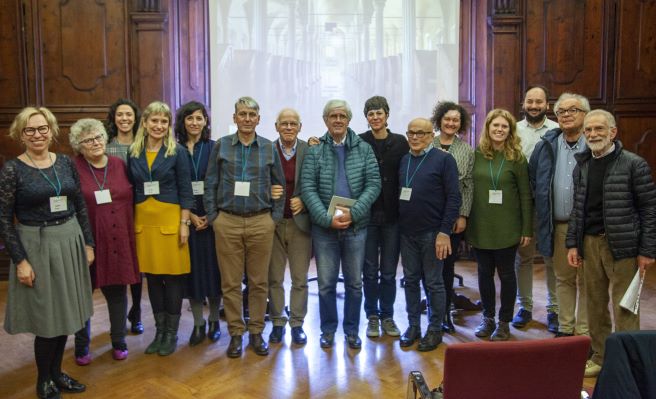Community of practice
Also known as: Working groups
A community of practice is a long-term approach to knowledge sharing between groups of organisations. Participants choose a theme and share their own approaches, working together to improve each other’s and their own practices over a number of months or years.
Typically, study visits, training, and online meetings are used to keep up contact and exchange inspiration. Holding such a community together is often a shared ambition, ranging from the design of an action plan to the implementation of a new set of policies.
This is a non-hierarchical approach that acknowledges that participants will have different contexts, strengths and weaknesses.
Method
A community of practice is essentially a collaborative framework where groups of organisations come together to share knowledge and improve practices. The structure of such a community usually revolves around:
- Theme selection: A central topic or theme, relevant to all participants, is chosen to steer the discussions and collaboration.
- Knowledge sharing platforms: A blend of offline and online interactions like study visits, training sessions, and webinars facilitates knowledge dissemination.
- Continuous interaction: Regular interactions through various mediums ensure that the community remains engaged, updated, and benefits from the continuous flow of ideas.
- Shared objectives: Participants often work towards common goals or projects which keep the community cohesive and driven.
Examples of application
Eurocities’ EU-funded CitiMeasure Project
In the CitiMeasure project, the Community of Practice was formed around specific themes related to citizen science, including comparability, digital inclusion, and behavioral and policy change. The community members were selected based on a call for expression of interests in these areas, which ensured that each group was invested in its topic. Through the community, participants could exchange experiences, share best practices, and access resources.
The emphasis was on refining individual approaches through collective learning, making the community a platform for discussion and a space for actionable insights and practical improvements.
Eurocities’ AMIF-funded CONNECTION Project
The CONNECTION project centered on migrant integration, enhancing collaboration among cities facing similar challenges. The Community of Practice in this context was action-oriented, with activities designed to facilitate direct engagement and practical learning. Study visits allowed participants to gain first-hand insights into how other cities were managing migration-related issues, while staff exchanges offered a deeper understanding of daily operations across different cities. The community also engaged in collaborative projects, such as developing standardised guides and crafting local action plans.
Eurocities’ EU-funded Prospect+ Project
Prospect+ took the Community of Practice methodology into the realm of innovative finance. This project was unique in its structured approach to participation, which was tiered to accommodate different levels of engagement. Regular online meetings keep all participants updated on new developments, while replication webinars are designed to disseminate new ideas and best practices. Additionally, policy discussion webinars provide a forum for in-depth dialogues on relevant topics.
What sets this project apart is its tiered participation model, which allowed for a more customised engagement experience. Participants could choose from the following engagement types: ‘active,’ ‘observers,’ or ‘experts,’ depending on their interest and expertise. This structure provided flexibility and encouraged a broader range of participants to contribute according to their capacity.
- Active: For those eager to share experiences and provide feedback on policies.
- Observer: For individuals primarily interested in attending webinars and assimilating information.
- Expert: Targeted at those poised to share best practices with the community.
Eurocities’ EU-funded NetZeroCities Project
The NetZeroCities project Community of Practice brought together a diverse group of practitioners from sectors including public and private organisations, academia, and NGOs. The focus is on sharing knowledge and best practices across a wide range of climate-related topics, such as mobility, construction, the circular economy, and energy.
This community took a multidisciplinary approach, bringing together a wide array of stakeholders to work towards a common goal, creating a rich environment for knowledge exchange and fostering a holistic approach to addressing climate challenges. Practically, the community provides a space for members to engage in discussions, participate in and host webinars, and share resources related to climate neutrality.
Top tips
Engaging with the appropriate staff in the participating organisation is essential. In the context of an EU-funded project, the community is bound to be less successful when staff from the EU funding unit join the discussion rather than staff working directly on the topic.
Only works with experts from a clearly defined domain and a comparable role – this ensures a clearly scoped discussion and useful answers for participants.
It can take time to build momentum and community, so plan for the long term in advance. Make a calendar of events, activities and content covering the initial phase.
You will need people with influence and/or extensive networks to bring members to the community and build momentum. These people can be prompted and given insights to activities and invited to contribute.
To create a secure and trusting environment, consider creating a set of shared values or a code of conduct in collaboration with community members.
Pros & cons
Pro
- Communities of practice are great for co-sharing and co-creation. There is normally a wide range on knowledge and expertise. In case of CitiMeasure, the expertise and interests of participants in the working groups were the driving force behind the outputs.
- Communities of practice are a great way for cities to share experience but also shares challenges and ask support from their peers.
- Compared to one-on-one formats, communities of practice have the advantage that the risk of suboptimal matching is lower; where one partner has gaps in their knowledge or ambition, others can make up for it.
- Communities of practice are responsive and empower community members.
Con
- The level of commitment and inputs differ from one member to another. Turnover of the members may also affect results because an onboarding phase is needed for new members and their approach may affect the process.
- Language issue and the position of the person the city sends to take part in the project can be obstacles. It is less successful when staff from the EU funding unit join the discussion rather than staff working on the topic.
- Having associations of local cities as a partner may not work very well.
- Only works with experts from a clearly defined domain and a comparable role – this ensures a clearly scoped discussion and useful answers for participants.
- Communities of practice often have a life span. Once a shared objective has been realised, enthusiasm may dwindle or members may disengage. However, community managers can consult with members on shifting the focus or establishing a new objective.
Outcomes and impact
- Knowledge amplification: Participants’ shared experiences result in enriched collective knowledge, as seen in the CitiMeasure project.
- Innovative solutions: Diverse backgrounds lead to unique strategies for challenges, like in Eurocities’ CONNECTION project.
- Professional growth: Exposure to best practices and feedback fosters individual expertise.
- Shared resources: Communities often produce valuable assets like guides and webinars, as showcased in the Prospect+ project.
- Enhanced collaboration: Networking within the community often spawns further collaborative ventures.
- Informed policymaking: Real-world insights, like from Prospect+, guide better policy decisions.
- Resilience: The collective expertise of the community offers a support mechanism, providing solutions to individual challenges.
- Recognition of expertise: Platforms like Prospect+ highlight and reward expert contributions.
Impact
Eurocities’ CONNECTION project and grant represented a great opportunity for the city of Zagreb to start working on integration and acted as a driving force for the creation of the city’s action plan for the integration of asylum seekers and persons granted international protection in Croatia. The workshop held in Zagreb allowed the city to create or strengthen new links and cooperation opportunities, with city departments, with local NGOs working on integration and other institutions. The action plan is a milestone in the collaboration between the city and NGOs and positioned the city as coordinator for all local integration issues.
In 2016, as part of Mayors Adapt, Munich (mentor) hosted Prague (mentee) for a visit focused on the renaturation of the Isar river; on green areas to reduce the urban heat island effect; and energy refurbishments in historical buildings. City officers from the two cities kept strong links and visited each other twice in Prague without any project funding for technical exchanges on restoration and adaptation to climate change and organised one political event in Munich with political representatives from the two cities. Prague is also relaying on Munich’s experience to produce its own adaptation strategy.
In Mayors Adapt, Antwerp visited Copenhagen in 2016 leading to concrete developments in Antwerp:
- On cloudburst planning, and risks analysis
- On developing a water plan with the sewage company Hofor in Copenhagen offering technical support, thanks to their contacts in the City of Copenhagen.
On developing a co-creation processes with citizens in the neighbourhood St Andries to experiment with climate adaptation on rooftops and cocreating garden streets.
Pitfalls
Under preparation can be the death of a community of practice, before it even gets off to a start. You must ensure that the time that participants have set aside to engage with the community reflects the level of ambition promised in the project application and grant agreements as regards the outcomes, number of participants, number of meetings etc. This could be briefly described in the proposal to avoid misunderstandings.
To ensure quality exchanges and engagement, moderation is important. Moderation can be supported by a code of conduct, manifesto or other statement of values.
Links
The process and outputs are captured in CitiMeasure D1.6: Prototypes of the three instruments.


